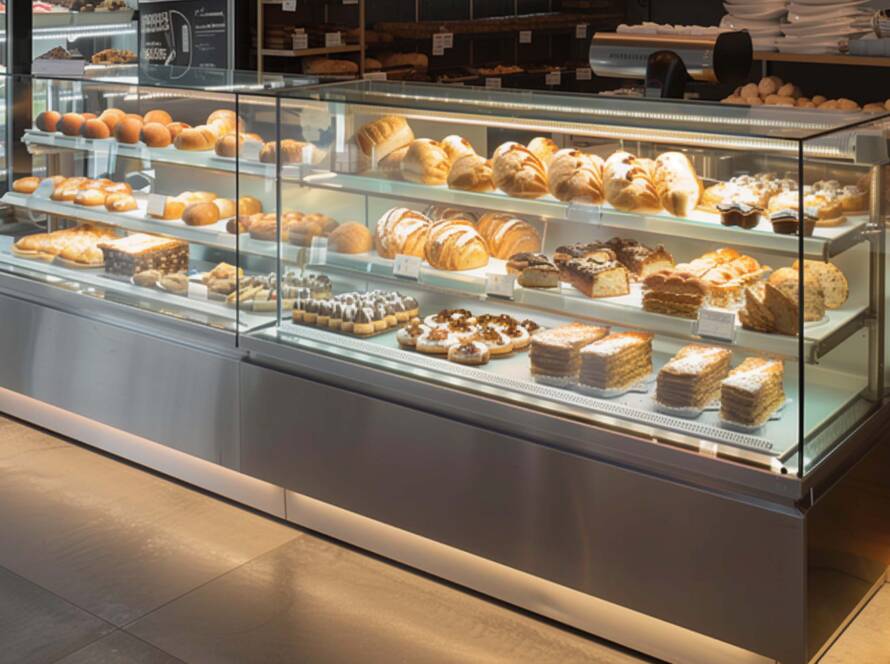Introduction: Importance of Good Hygiene in Commercial Refrigeration Units
Have you seen how much a quality-clean refrigeration unit in a store can naturally stand out to you? That’s why having clean Commercial Refrigeration Units gives off a strong impression as brand representatives in any retail or food business.
Regular maintenance and cleaning of refrigeration units are important for keeping things looking good as well as for food safety, saving energy, and extending the life of your equipment. Make sure that, no matter if you run a supermarket, cafe, or cold storage facility, the glass and internal parts are kept spotless at all times.
Are your refrigerators running smoothly and always neat?
Recognizing why Commercial Refrigeration Maintenance is necessary.

Why do you need to maintain Commercial Refrigeration Units?
In short, these refrigeration units support the storage and display of your perishable goods. Without proper maintenance:
- Cooling efficiency drops.
- Energy consumption spikes.
- Food spoilage becomes frequent.
- The units will not last long, and this leads to unnecessary costs.
By staying on top of Commercial Refrigeration Unit maintenance, you help them work efficiently, keep your products safe, and leave a good impression on your customers. Isn’t this the goal of every business?
Maintenance Requires More than Just Cleaning
Cleaning is necessary! but only as a first step. Real maintenance of Commercial Refrigeration Units has a checklist of responsibilities to make sure everything keeps operating correctly or is operating at optimal performance. The list includes:
– checking electrical connections
– refrigerant levels
– door gaskets
– cleaning filters, coils, and tubing.
When was the last time you went beyond cleaning just the outside glass surfaces of your Commercial Refrigeration Units?
A Properly Maintained Fridge Will Save You Money

You may think that maintenance is an expense- but in reality, maintenance is a cost-saving expenditure.
Here is how a well-maintained Commercial Refrigeration Unit returns time and again:
- Reduced energy costs – if the coils are dirty or the gaskets are leaking air, the refrigeration unit must work harder.
- Fewer repair costs – if you know what and where it is worn, you can detect it at an early time in its life cycle to prevent a major breakdown.
- Preserving food products – preventing spoilage through proper temperature and time.
- An extended service life – regular maintenance can often extend the life of your Commercial Refrigeration Unit by years.
Why spend more money on something new when you can put money toward maintenance of the old?
Key Portions of Commercial Refrigeration Units
Knowing the essential parts of your Commercial Refrigeration Units allows you to ascertain what warrants attention. The main parts are:
- Evaporator Coils – responsible for siphoning heat from inside the unit.
- Condenser Coils – responsible for dissipating heat outside the unit.
- Air Filters – responsible for airflow and preventing dust from building up.
- Drain Pans and Tubes – responsible for draining condensation.
- Door Gaskets – responsible for containing and securing the seal when the door is shut.
- Glass doors and panels – responsible for holding products and allowing visibility of products on display.
- Stainless steel surface – responsible for preventing rust and corrosion.
- Tubing, split doors – responsible for distributing cool air and controlling energy.
If you let any of these components suffer, the integrity of your Commercial Refrigeration Equipment will be compromised.
Importance of Cleaning the Evaporator Coils
Think of evaporator coils within commercial refrigeration units like the lungs. Evaporator coils are responsible for absorbing heat from the inside of the unit, preserving cool temperatures and the quality of your food and beverages.
When heat exchanger evaporator coils become dirty or frozen, you could lose all forms of benefits:
- Air flow is impeded.
- Frost accumulates, which exacerbates the heat in the exchange process around the evaporator coils.
- You greatly increase the energy consumption of the unit.
Cleaning Tip: You can remove dust with a coil brush or compressed air each month. Just be sure to turn off the unit before you clean as it could damage components. A little maintenance goes a long way in maximizing the efficiency of your Commercial Refrigeration Units, but it equally helps limit energy waste.
Significance of Condenser Coils in Refrigeration Units
Where evaporator coils absorb heat from the area being cooled, condenser coils release heat to the outside world. Most Commercial Refrigeration Units will have the condenser coils as either a wrap on the back, or as a pan underneath.
When the condenser coils are coated with dirt and grease:
- The unit will run hot.
- The compressor will work harder, and will likely fail sooner.
- The unit may not have as consistent cooling.
Cleaning Instructions:
- Unplug the unit.
- Use a vacuum or soft brush.
- Spray with a non-abrasive coil cleaner.
If you keep your condenser coils clean, your Commercial Refrigeration Units will be thankful with less breakdowns and lower electricity bills!
Air Filters in Commercial Refrigerators Units
Air filters in Commercial Refrigeration Units are often ignored. However, they’re a very important part of keeping clean and dry air in the cabinet.
A clogged air filter can:
- Diminish airflow.
- Make the compressor work harder.
- Disperse mold and bacteria.
Make it a monthly habit to check and clean the air filters in your Commercial Refrigeration Units, and replace them quarterly or as necessary. With clean air filters, you now have better hygiene and longer lasting Commercial Refrigeration Units.
Step-By-Step Cleaning of Commercial Refrigeration Units

Use this systematic method to clean your commercial refrigeration units the right way. Let us see the stage wise cleaning process of commercial refrigeration units :
- STEP 1 Unplug the unit, for safety reasons.
- STEP 2. Remove all contents for proper surface cleaning.
- STEP 3. Next, remove any shelves and drawers in the unit and let they soak in warm soapy water.
- STEP 4. Clean the glass surfaces with a vinegar-water solution or glass cleaner.
- STEP 5. Wipe the inside walls of the unit remembering to pay attention to the corners and any seams.
- STEP6. Disinfect all of the surfaces using food safe sanitizer.
- STEP 7. Clean the vents, coils, filters, drain pans, and gaskets.
- STEP 8. Lastly, dry it thoroughly before you put it back together.
- STEP 9. Plug it in and refill your items.
Performing the above measures will allow you to get everything off to a good start and maintain the performance and appearance of your commercial refrigeration units.
Drain Pans and Tubes Care
The Process: How To Clean Drain Pans
A drain pan is where the condensation accumulates, if cleaning was not scheduled or planned, you might as well be trying to maintain a mold farm underneath your unit. You would be surprised to know how much of a breeding ground some organisms can be after even one cleaning.
Check for a slide-out or remove the drain-pan and usually all that needs to be done is washing it out with warm water and baking soda.
Next disinfect, and dry thoroughly.
Tubes: Things To Be Aware Of
The drain tubes take any water from inside of the unit to the drain pan. So, a blocked drain tube could lead to internal leaks or even internal flooding in your unit.
- Clean the tubes removing anything that may deter the flow of water. It’s best to use some compressed air or flexible brushes to remove debris.
- See to it that you flush the tubes with warm water monthly.
- Finally check for knicks or cracks from normal wear.
Cleaning drain systems = smell cleaner, no leaks Commercial Refrigeration Units
Frequencies and Importance of Maintenance
| Task | Frequency |
|---|---|
| Wipe spillage & sanitize | Daily |
| Clean shelves & doors | Weekly |
| Check coils & filters | Monthly |
| Do deep cleaning | Quarterly |
| Have an inspection done | Twice a year |
Neglect = expense. Make a schedule and stick to it!
Door Gaskets inspection and replacement
Door Gaskets are essential for keeping cool air inside and warm air outside of the Commercial Refrigeration Units.
Cleaning Door Gaskets: A How-To
- Mix warm water and some mild soap.
- For recesses you can use a toothbrush.
- Rinsing and drying also helps prevent the spread of mold.
Making The Call To Replace Your Door Gasket
You should replace the door gaskets if the gaskets are:
- Broken, or brittle
- Ripped, or warped
- Not sealing properly
Poor seals = poor cooling = poor Commercial Refrigeration Units Performance.
Best Practices for Cleaning Stainless Steel Surfaces
Cleaning Protocol
- Use a microfiber cloth with stainless steel cleaner.
- When cleaning, wipe in the direction of the grain to avoid scratching.
- Avoid cleaning using bleach or abrasives.
Maintaining Shine & Preventing Damage
- Buff dry using a soft cloth.
- Used a little oil or polish once a week.
- Wipe the fingerprints off immediately.
All of the above enhances the professional appearance of your Commercial Refrigeration Units and extends their lifespan!
Regular Cleaning is Key
When was the last time your units cleaned — correctly?
When it comes to cleaning your units, regular is not an option — it is a necessity. Customers see everything, especially if it is a food environment. Your sparkling glass and clean insides reflect your quality.
Keep your Commercial Refrigeration Units looking and performing like new — every day!
Here Are Some General Tips For Maintaining the Rest Of The Components
In Your Commercial Refrigeration Units
Cleaning Tubing Regularly
- Helps prevent mold and blockages and helps maintain a constant flow of cooling.
- Use pipe cleaners and/or narrow brushes.
Maintain Your Split Doors To Ensure They Seal
- Tighten hinges and clean door tracks.
- In some cases you will have to realign your doors.
- Also, make sure to check your gaskets and replace them if necessary.
Clean Up Spills Immediately To Prevent Damage
- Use a soft cloth and non-toxic quick spill cleaner.
- Can help prevent stains and odor.
- Helps reduce potential for slip hazards inside the unit.
Every component of your Commercial Refrigeration Units contributes to keeping them healthy and functioning as expected.
Conclusion: Clean Units = Better Business
A clean well-maintained Commercial Refrigeration Unit not only stores products, it sells them. It represents your brand, it supports your operations, and makes your customers feel confident about the quality of your product.
Are you planning to upgrade refrigeration in your business? TPRS got efficient and innovative Glass solution that is gonna come handy in the long run. Saving energy, clarity, durability and what not; when it comes to glass, TPRS got you!
Frequently Asked Questions
Routine cleaning, monthly inspections, and annual replacement of parts will assist in prolonging the life and performance of Commercial Refrigeration Units.
Organize food products by type, label shelving, clean/organize the inside every week, and clean glass/handles every day. Clean and organized Commercial Refrigeration Units are not only more efficient, they also look great.
Use mild soap for the interior, vinegar for the stainless steel, food safe sanitizers for surfaces, stainless steel cleaners for stainless steel surfaces, and microfiber cloths for all surfaces in your Commercial Refrigeration Units.
A light daily clean, a weekly wipe of the shelves, a deep clean once a month, and it’s advised that a professional checks your refrigerator twice per year– this should keep your Commercial Refrigeration Units looking as they should, functional, and ensuring their longevity.





